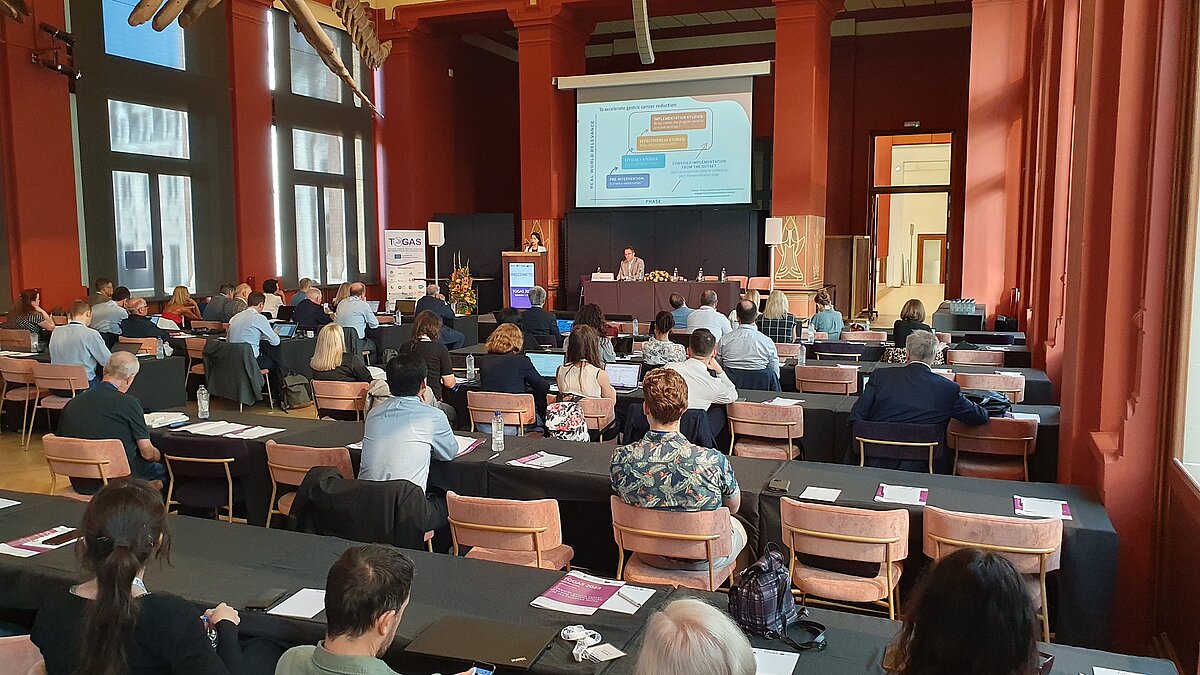
On September 7, in Antwerp, Belgium the Institute of Clinical and Preventive Medicine of the University of Latvia (LU CPMU) held the first project TOGAS - Towards gastric cancer screening in the European Union outreach conference on gastric cancer screening for health policy makers, researchers and medical specialists of the European Union (EU) member states. The conference was attended by about one hundred participants, including representatives of twenty project partners from 14 countries.
The goal of the TOGAS project is to develop recommendations for the introduction of gastric cancer screening in EU countries. To achieve this, it is planned to conduct three large-scale pilot studies, with the help of which various aspects of gastric cancer screening and early diagnosis will be developed within 36 months. At the same time, cost-effective guidelines for the implementation of successful screening will be developed in line with medical ethics norms. This is necessary because there is currently a lack of effective gastric cancer screening methods in Europe. Current research shows that the eradication of Helicobacter pylori, a bacterium that lives in the stomach and promotes the development of stomach cancer, could reduce the number of deaths caused by stomach cancer by as much as 40%, so it is essential to find ways to implement this prevention in practice.
The scientific leader of the project, director of LU CPMI, prof. Mārcis Leja gave an overview of the general goals and tasks of the TOGAS project, the work planned in the project, as well as the expected cooperation with European institutions within the project. M. Leja demonstrated the place of the TOGAS project in the overall spectrum of EU activities in the fight against cancer.
During the conference, Dr. Jin Young Park from the International Agency for Research on Cancer emphasized the substantial and enduring global burden of gastric cancer, underscoring its continued significance as a public health challenge in Europe. In her address, she highlighted the ongoing escalation of cancer cases in the coming decades and the persistent disparities in gastric cancer, necessitating global action due to the exorbitant costs associated with cancer treatment. Consequently, she stressed the pivotal role of prevention and early detection in cancer control. She also emphasized the importance of implementing prevention strategies across diverse contexts to gather essential data on implementation outcomes and to rigorously conduct region- and population-specific decision analyses.
Professor Paolo Boffetta, an Italian epidemiologist affiliated with the University of Bologna and renowned for his research on cancer and chronic diseases, delivered a presentation at the conference titled "Gastric Cancer Prevention within the Framework of Occupational Health Surveillance." In his presentation, he discussed the prevention of three infection-related cancers through interventions integrated into occupational surveillance programs. These included addressing H. pylori and gastric cancer, Hepatitis C virus and liver cancer, and human papillomavirus in relation to anogenital and head-neck cancers.
In the session "State of the play" – professor Peter Malfertheiner, Ludwig Maximilian University of Munich, Germany presented “The update of gastric cancer prevention in the current guidelines”, professor Paul Moayyedi, McMaster University, Hamilton, Canada - gave an overview of “Current evidence of the effect and cost-effectiveness of the H.pylori test-and-treat strategy for gastric cancer prevention”. MD, PhD Yi-Chia Lee, Taipei, Taiwan presentation was on the topic “What we can learn from long-term implementation of a population-based H.pylori eradication Strategy”. In session "Time for global action", professor of cancer epidemiology Wen Qing Li, Peking University Cancer Institute, China presented “Linque county study status”, but Alma Zhylkaidarova from Kazakh Institute of Oncology and Radiology – “Experience with endoscopic gastroesophageal cancer screening in Kazakhstan”, Constanza Camargo, MD, National Cancer Institute, USA – “Overview of gastric cancer prevention programmes in Latin America”.
 CONFERENCE
CONFERENCE